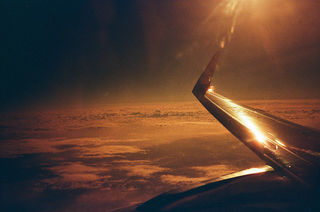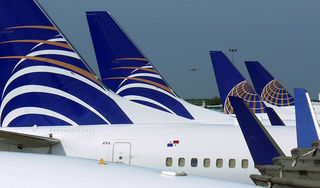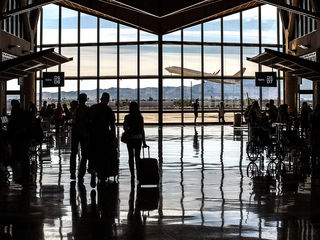Career
In Defense of United Airlines
The fiasco of dragging a passenger off a plane needs more tempered reaction.
Posted April 11, 2017
It’s been the most talked about story since this past Sunday night when a video of a man with a bloodied and battered face being dragged off a United Airlines airplane started circulating online. What made the video shocking was that the individual, a Kentucky physician, had paid for his seat like everyone else. But the airline had overbooked the flight, and could not find volunteers to give up their seats, even when it raised the compensation per seat to $1,000 for doing so. It randomly chose four people to bump off the plane. The other three passengers complied, but the physician refused to get off. As he got more trenchant, security personnel were summoned. They ended up manhandling him, dragging him through the plane to get him out, leaving him bloody and battered.

It seems like no one is talking about anything else at the moment. Through social media and other venues, large numbers of people have expressed intense outrage, calling for legislation to outlaw the practice of overbooking, an absolute boycott of United Airlines, a debilitating lawsuit against the company, and many other stratagems to bankrupt it.
Unquestionably, the episode was a service failure by the airline from start to finish, both within the airport terminal and inside the airplane itself. The subsequent handling of communication was not particularly competent either, with the airline’s CEO calling the physical assault a case of “re-accommodating” the passenger.
Still, I feel compelled to offer some words in defense of United Airlines, and a few thoughts about the overreactions of people in response to this occurrence. For the sake of decency, I am going to leave out discussion of whether the customer’s behavior was appropriate, and the issue of how much blame should be assigned to law enforcement officials who physically manhandled the customer versus the airline's employees. Instead, I will focus on three themes that I have been thinking about.
1) Airlines provide an extraordinary and complex service that we, as consumers, have stopped appreciating sufficiently.
United Airlines, like all other airlines, provides an extraordinary experience to its customers. The very thought of traveling thousands of miles within hours, several miles up in the air at close to the speed of sound with a vanishingly small chance of accidents, would have seemed like sorcery just a few decades ago. The words of pilot Mark Vanhoenacker about flying are worth contemplating for a few seconds:
“I can’t think of an easier thing to find a sort of basic human joy in. It’s really quite a spiritual experience, and it’s also this amazing technological achievement. A lot of pilots have those things as the two halves of their personalities. They have a romantic sensibility about the world but are also amazed by science and technology. Flying is a very old dream of our species, and when we look out at a 747 waiting to take us halfway across the world, we’re looking at a dream come true. It maybe doesn’t feel like that because we do it so often now, but planes are literally a dream that’s come true.”
Yet, as he says, today we jump on a plane without thinking twice. We have adapted to this extraordinary experience, and sadly, taken it for granted. We no longer consider (if we ever did) how difficult it is for airlines to coordinate all the activities that have to occur to make accident-free, mostly incident-free travel possible day in and day out, and how difficult it is to breakeven, let alone make money and remain in business.

Delivering extraordinary and complex services to a large number of customers requires many moving parts, and sometimes these parts don’t function perfectly. For example, in the present case, airline employees at the gate should have resolved the issue of who would get left behind before a single person boarded the plane. They could have upped the compensation offer beyond $1,000 until it was high enough for someone to volunteer delaying their journey. Within the plane, security should never have been called, and security officials should never have dragged the customer even when he was uncooperative. This is all true.
To me, however, these mistakes seem relatively small and idiosyncratic when compared to the extraordinary benefits we collectively enjoy from today’s air travel. And while it is undeniable that this individual customer suffered grave physical harm, the punishment (to the airline) should be in the form of appropriate recompense to the individual, not broad, permanent damage to the entire company.
2) Overbooking on planes is a common practice and is based in sound economic and psychological principles.
Overbooking is a common practice not only in the airline industry, but also in hotels and even hospitals. Basically, every service industry with perishable capacity uses, or tries to use, overbooking. Just for context, over half a million people with valid airline tickets faced the consequence of overbooking and couldn’t board their designated flight last year in the US alone. Overbooking is good business practice because it maximizes the combined welfare of customers and the company. It increases the company’s welfare by reducing wasted capacity and allowing it to earn more revenue with its fixed resources. It increases consumer welfare, because companies can offer customers better deals and lower prices.
More importantly, overbooking is based on sound economics logic going back several decades, and uses predictable consumer psychology. It is a direct response to the gap between what people intend to do and what they actually do. If every customer that bought a ticket showed up and boarded the flight, overbooking would instantly disappear.
The calls to outlaw overbooking in airplanes because of this one incident make little sense to me. For the reasons I mentioned, banning the practice of overbooking will adversely impact the company’s welfare by wasting spare capacity, and it will reduce consumer welfare because airlines will increase prices to account for the inefficiencies forced upon them, to maintain their revenue and profit levels.
3) While extreme reactions to singular, outlier events have become the status quo in every arena of life, they shouldn’t be.
Do you recall the case of Justine Sacco? The senior corporate communications executive wrote one ill-considered tweet before boarding a long-haul flight. When she arrived at her destination, her career was over and her life was in shambles. Social media has amplified both the speed with which news about otherwise obscure incidents travels, and the intensity of consumers’ emotional responses to them. Saying something outrageous and extreme, or making fun of others in hurtful ways, or shaming strangers in a way that is entirely disproportionate to their fault is more likely to garner attention and popularity than a temperate response. Granted, it was horrendous to watch the bloody and battered Kentucky physician being dragged off the plane, but I still feel that a fairer sense of proportion is warranted. Over 40,000 people were involuntarily bumped off American planes last year, but no other such incidents occurred (at least that I could find). This incident was clearly an outlier.

United Airlines has over 82,000 full-time employees, and having flown on hundreds of flights with them over the past two decades and experienced excellent service for the most part, I am befuddled by the calls for total boycott, the condemnation of this giant company as a whole, and the desire for its bankruptcy based on this incident.
Surely, there is a gap between the momentary mistakes and poor decisions (even if they were serious ones) of a handful of employees at one gate in one airport and the collective labor of 82,000 people globally that defies extrapolation? I feel the collective harm caused by the failure of a major airline company to all of us will far outweigh any benefits that would accrue from such incidents not happening in the future. I, for one, derive tremendous benefit from the actual tangible connection that United Airlines provides me to the rest of the world.
Calling for boycotts is a lot like crying wolf. It should be reserved for the rare occasions when there really is a wolf.
P.S. You may enjoy reading this blog post by a pilot's wife which takes the same position as I did in this blog post, but describes the nuances of airline and airport security rules in detail:
I Know You’re Mad at United but… (Thoughts from a Pilot Wife About Flight 3411)
Note regarding conflicts of interest
Just to be clear, I do not own any individual United Airlines stock nor do I consult or work for this company in any capacity or for any remuneration. However, some of my ex-students (that I really like) do work for United Airlines.




